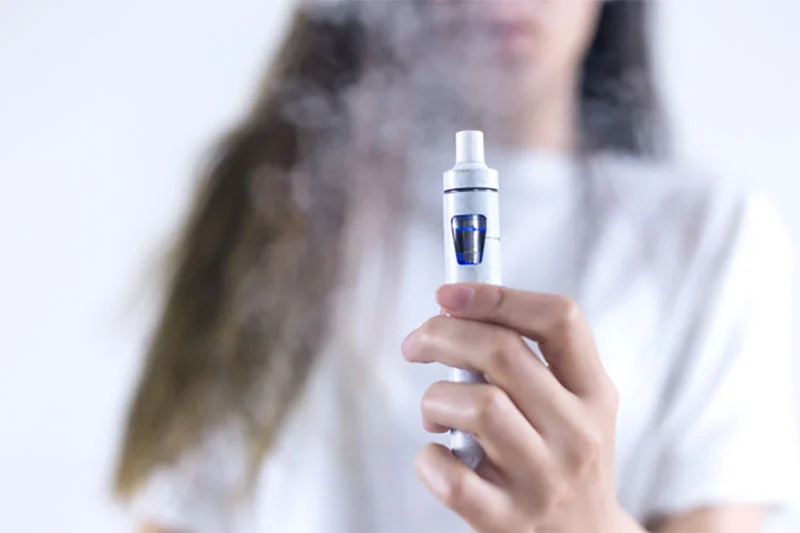
Kpods in Singapore: Health Dangers & Insurance Coverage
01 Aug 2025
If you have been following the news in Singapore, you should be aware of the recent plethora of reports about Kpod addiction and the detrimental effect it has. Singapore has seen a disturbing surge in the use of Kpods—vape cartridges laced with dangerous sedatives like etomidate and ketamine. While they may look like the usual flavoured e-cigarettes/vaporisers, these pods are far from innocent.
In a recent report from the Ministry of Health (Singapore), it was found that 1 in 3 vapes were laced with etomidate. This alarming trend has seen some users exhibiting trance-like, zombiestyle behaviour, with some even passing out in public around Singapore. One mother shared how her teenage son’s addiction to Kpods left him trembling, hallucinating, and emotionally detached. The family racked up over S$30,000 in treatment and rehabilitation costs in the hopes of pulling him out of his Kpod addiction. In an even more tragic case, a 19-year-old Singaporean girl, Shermaine Tay, was seen on security footage stumbling out of her flat at around 2:30 a.m. displaying signs of serious intoxication likely linked to Kpod use. Minutes later, she was found dead at the foot of her HDB block. Her death was ruled accidental following a fall.
These heartbreaking stories are no longer isolated cases, they reflect a growing public health crisis that demands greater awareness, action, and support.
In this blog, we break down what you need to know about:
- What Kpods are and why they’re so dangerous
- The health and long-term cancer risks of vaping
- How your health insurance may be affected
- Where to get help and what’s actually covered in Singapore
What are Kpods?
Kpods are vape pods infused with potent sedatives, typically etomidate, an anaesthetic used in emergency surgeries to knock patients out. Some vapes may also contain ketamine, THC (tetrahydrocannabinol), or other synthetic drugs.
Vaping is illegal in Singapore but these vape products still manage to find their way to our youths and other impressionable people. Regular e-vaporisers and Kpods are often circulated through Telegram or peer-to-peer sales, disguised as ordinary flavoured vapes. But many users, especially teens, may be unaware of what’s really inside until it is too late.
As of mid-2025, the Health Sciences Authority reported 28 cases of drug-laced vape seizures, nearly triple the number in 2024. In response, the Government plans to tighten vaping laws, especially around etomidate-laced Kpods. While etomidate is currently regulated under the Poisons Act, moves are underway to classify it under the Misuse of Drugs Act, which would bring harsher penalties including jail time and mandatory rehab for users.
Vaping is more dangerous than you think

So, you may be thinking, “Regular vaping is safe! It doesn’t have any drug components in it and the fruity flavours means it’s harmless.” But that’s where you’re wrong.
Even without the drug-laced contents of Kpods, vaping is far from harmless. According to the CDC and American Lung Association, e-cigarettes release toxic compounds like formaldehyde, acrolein, and acetaldehyde, which are linked to lung and heart damage.
Smokers looking to quit smoking may even look to vaping as a “safer” alternative. However, large-scale studies, such as those reported by the Thoracic Society, have shown that ex-smokers who vape face an elevated risk of lung cancer compared to those who have quit without vaping.
What is in a typical vape?
Vaping is addictive. And although the fruity flavour makes it seem harmless and fun, it is hiding a more sinister concoction of substances that are detrimental to your well-being. These harmful substances include:
- Nicotine: Extremely addictive and harmful to adolescent brain development
- Heavy metals: Like lead and nickel, leached from heating coils
- Volatile organic compounds (VOCs): Linked to cell damage and respiratory irritation
- Flavouring agents: May be safe to eat, but not to inhale
Health risks associated with vaping

Vaping is still relatively new but the health risks associated with it have been reported worldwide, including Singapore. One of the main health concerns of vaping is lung cancer. Although vaping does not involve burning tobacco like traditional smoking does, it still exposes its users to harmful substances such as:
- Certain chemicals which can damage DNA in lung cells
- Some compounds which have been linked to an increased risk of lung and bladder cancers
- Nicotine, while not a carcinogen, can promote tumour growth by encouraging blood vessel formation
The long-term cancer risks of vaping are still being studied, but early evidence is worrying—especially for young, frequent users.
Other significant health effects of vaping
- EVALI (E-cigarette or Vaping Product Use-Associated Lung Injury): EVALI can lead to permanent lung scarring and even death
- Chronic bronchitis and airway inflammation
- Popcorn lung (bronchiolitis obliterans): Popcorn lung, originally termed because it was first discovered in workers who worked at microwave popcorn factories, is caused by inhalation of diacetyl, a flavouring chemical
- Increased risk of respiratory infections
- Heart disease: Vaping increases heart rate and blood pressure, and long-term use may raise the risk of heart attack, irregular heartbeat, and arterial damage.
In Singapore, where vaping is illegal, the lack of regulation around ingredients makes these risks even higher.
The health risks of Kpods
Vaping alone carries a significant amount of health risks, so when sedatives like etomidate or ketamine are added to a vape, the danger skyrockets. These substances have been documented to affect brain function, respiratory control, and heart rate, thus making KPods especially hazardous.
Short-term effects of Kpods include:
- Seizures or fainting
- Blank stares, dissociation
- Aggressive or zombie-like behaviour
- Nausea, dizziness, tremors
- Risk of overdose and unconsciousness
Long-term risks of Kpods include:
- Memory loss and concentration issues
- Depression, anxiety, or psychosis
- Drug dependency requiring rehabilitation
- Permanent brain and respiratory damage
- Potential fatality from misuse or mixing substances
To make matters worse, the drugs in Kpods can cause withdrawal symptoms so severe that users may require inpatient detox programmes or psychiatric support.
What may be covered
MediShield Life & Integrated Shield Plans (IPs):
Your MediShield Life and your Integrated Shield Plan typically has coverage for mental health support linked to addiction. Basic plans include:
- Up to 35 days/year of inpatient psychiatric care
- Daily limits (e.g., $160/day under MediShield Life; higher with IPs)
- Pre- and post-hospitalisation coverage if related to an inpatient admission and seen by a panel doctor
- Some plans include optional mental wellness insurance riders for outpatient therapy
MediSave:
- You can use up to $500/year for outpatient mental health consultations at approved clinics
Corporate or School Insurance:
- Some corporate or school insurance plans may include mental health coverage, but this is not guaranteed or consistent
What’s not covered or may be affected
- Pre-existing conditions: If addiction is disclosed or discovered, it may lead to higher premiums or exclusions in future plans
- Outpatient therapy: Without a rider or add-on, most private plans don’t cover weekly therapy sessions
- Non-panel treatments: If you seek care outside your insurer’s panel, claims may be rejected or reduced
- Illegal activity: Use of banned substances (like Kpods) could void coverage if linked to your hospitalisation
Could Kpod use affect my future health insurance plans?
1. Buying new policies: Your application may be declined or restricted
When you apply for a new health insurance policy in Singapore, especially an Integrated Shield Plan with private insurers like AIA, Prudential, Great Eastern, or Singlife, you are required to declare your full medical history.
If you’ve been diagnosed with a substance use disorder, or have undergone rehabilitation or psychiatric treatment for Kpod addiction, this will show up in your health declaration.
What insurers may do:
- Reject your application outright (especially for riders or high-tier coverage)
- Exclude coverage for any mental health or substance-related claims
- Offer a restricted plan with lower annual limits or higher deductibles
This applies not just to your Integrated Shield Plan, but also to other insurance policies such as Life Insurance, Critical Illness, and Personal Accident Plans, as most of them require full underwriting.
2. Higher premiums (risk loading)
Even if your application is accepted, the insurer may consider your history of addiction a “pre-exisiting risk factor.” This means your premium will be higher, a practice known as risk loading.
For example: A policy that normally costs SGD$1,200 a year, may cost $1,800 or more instead.
This is because insurers view past addiction as a predictor for future claims such as:
- Psychiatric relapses
- Hospitalisation for overdose or withdrawal
- Respiratory conditions, lung damage, or cancer linked to vaping
3. Claim denials if you fail to disclose your past Kpod use
If you develop a medical condition later on (e.g. lung disease, depression, or even cancer), and your insurer discovers that your past Kpod addiction was either not disclosed during your application or is relevant to your current diagnosis. They can either reject your claim outright, void your policy entirely, or only pay your partial benefits or retract backdated payments.
This claim denial applies to health-related insurance plans such as Integrated Shield Plans, Life Insurance (Term and Whole Life), Personal Accident Plan, and even Critical Illness Policies.
However, with that being said, if you have pre-existing or even congenital or chronic conditions that you did not disclose during your insurance application, the above claim denial can also happen.
4. Mental health and critical illness coverage may be excluded
Although there has been significant improvement in Singapore with regards to mental health coverage under our MediShield Life and selected Integrated Shield Plan riders, private insurance plans will often limit or exclude psychiatric-related conditions if you have a prior history of the following:
- Addiction
- Self-harm or attempted suicide
- Anxiety, depression, or psychosis linked to drug use
Where to get help in Singapore for Kpod addiction
If you or someone you care about is affected by Kpod addiction, don’t wait. Early intervention not only improves recovery outcomes, it can also protect your future access to health insurance. Addiction is a medical condition, and in Singapore, there are both public and private resources available for support.
Emergency and support helplines in Singapore
These helplines offer free, confidential support and guidance:
- IMH Mental Health Helpline – 6389 2222
24/7 support for mental health crises, including substance-induced psychosis - National Addictions Management Service (NAMS) – 6732 6837
Specialised support for addiction to vaping, drugs, alcohol, and gambling - Samaritans of Singapore (SOS) – 1767
Emotional support for those in distress, including family members of addicts - QuitLine (Health Promotion Board) – 1800 438 2000
Assistance for those trying to quit nicotine or vaping
Where to get treatment in Singapore
A. Public healthcare system
- Polyclinic → IMH referral: Visit your nearest polyclinic for an assessment. You may be referred to the Institute of Mental Health (IMH) or NAMS for subsidised care.
- Hospital A&E: In emergencies (e.g. seizures, overdose), head to the A&E of public hospitals like KKH, SGH, or NUH. Up to $500/year of your MediSave can be used for outpatient mental health consultations at approved institutions.
B. Specialised addiction services
- IMH addictions medicine department
- National Addictions Management Service (NAMS) at Buangkok Green Medical Park which offers detox programmes, rehab counselling, and psychiatric care
- Subsidised options available for Singaporeans and PRs
C. Private Mental Health Clinics
1. Gleneagles Hospital Psychiatry Services
- Gleneagles Hospital (Singapore) hosts visiting psychiatrists and psychologists as part of its multidisciplinary specialist team.
- For addiction-related conditions like Kpod use, patients can receive psychiatric assessment, medication management, and referral to allied support services.
- Location: Napier Road, near Orchard
- Appointment via: Gleneagles Hospital: On Your Side
2. Mount Elizabeth Hospital (Novena and Orchard) – Psychiatry and Psychology Unit
Provides access to senior consultants and psychologists experienced in:
- Substance use disorders
- Adolescent behavioural therapy
- Psychiatric rehabilitation
- Accepts corporate insurance and Integrated Shield Plans (check panel status)
- Website: Mount Elizabeth Hospitals: It’s Possible
Ideal for early intervention or counselling:
- Doctor Anywhere, WhiteCoat, Intellect, Safe Space
Services include video therapy, mental health screening, and psychiatric follow-ups
Note: Check if your employer or insurance includes free mental wellness credits
Final thoughts on Singapore’s Kpod addiction
Kpods are not “just another vape.” They are addictive, illegal, and potentially deadly. If left unchecked, this habit can ruin your health, finances, family life, and even your future ability to get properly insured.
If you suspect someone is using Kpods or facing vape-related issues, act now. Speak to a GP, explore mental health support, and review your health insurance coverage to avoid unexpected gaps in care.






